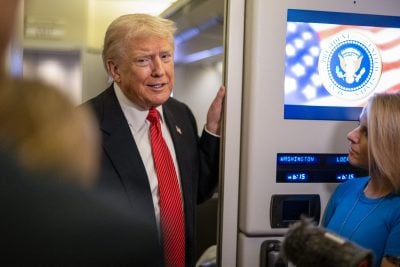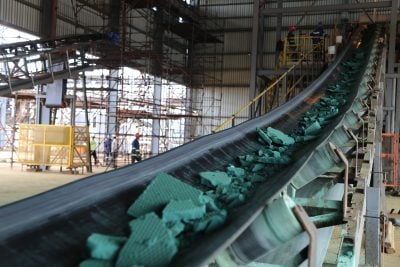As Nigerian frontrunners Bola Ahmed Tinubu, Atiku Abubakar and Peter Obi made passionate final appeals to voters in their bids to succeed President Muhammadu Buhari, it was becoming clear that the primary inheritance of whoever prevailed in February would be a struggling economy and a polarised society.
On his last day in office Buhari will leave behind a national debt of at least 77 Ntrillion ($167bn), according to the country’s Debt Management Office. This is more than twice the debt he inherited in 2015. It includes at least N26.9 trillion ($62.2bn) in domestic debt, N17.1 trillion ($39.7bn) in foreign borrowing and N22.7 trillion ($49.2bn) in ways and means financing from the Central Bank of Nigeria. The accumulation of debt saw Nigeria’s debt-to-GDP ratio jump from 33% to 45% in one year. When Buhari first took office in 2015, Nigeria had foreign debt of only $7.3bn and domestic obligations of N8.8 trillion.
Debt servicing in 2022 took more than 80% of federal government revenue; and the IMF reckons it will exceed 100% in 2023. Revenue performance has been poor, with oil output dropping to three-decade lows of around 1m barrels per day at one point last year as oil theft, enabled by corrupt government, industry and security officials, reached industrial scale. Reduced revenues from oil exports, the country’s main source of foreign exchange income, have exacerbated the woes facing the economy, with the value of the naira plummeting as the import-dependent economy scrambles for foreign exchange.
At the same time, the government has maintained a subsidy on domestic fuel use, identified by a number of government probes in recent years as a conduit for corruption. Payment of this subsidy consumed about a third of the 2022 budget after the government changed its mind about ending it as the 2023 elections were approaching, afraid of alienating the electorate. The decision to end the controversial subsidy is now being left to the incoming government to make by June.
Low ratings raise borrowing costs
The parlous financial situation has been reflected by the global rating agencies. In February 2023 Moody’s downgraded Nigeria’s rating to Caa1 from B3, saying that the government’s fiscal and debt position was expected to keep deteriorating. The effect is that it will cost Nigeria more to borrow on the international financial markets, possibly at a time when the new government will be in dire need of funds to get started. While Buhari insists he has done well during his two terms, even some party members concede that there have been failures.
“He has not been great with economic principles and policies,” Mustapha Audu, a spokesman for the All Progressives Congress (APC) presidential campaign, said recently on the Arise Television network. “We want people who have the ability to implement what they say,” he added, citing the candidacy of Tinubu, who is running to succeed his colleague. Buhari’s statist economic policies have been defined by currency restrictions, strict import controls and temporary border closures with neighbouring states in an attempt to spur domestic production.
As the economy has gone down, so has social cohesion. At the time Buhari took over in 2015, there were active armed conflicts involving the Boko Haram jihadists in the northeast, clashes over grazing land in the so-called Middle Belt and the militants in the oil region in the south. On the eve of Buhari’s departure, armed groups are active in every region of Nigeria. This security decline has particularly affected agriculture and the transportation of goods across the country.
Looked upon by many as the one who would halt Nigeria’s decline under the former ruling PDP in 2015, Buhari has disappointed some of his early supporters. Critics say that his political reflexes and statist economic outlook, moulded during Nigeria’s civil war years when he fought as a soldier before staging a coup to become a military ruler in the 1980s, are no longer suited to the needs of the country’s predominantly young population.
Former President Olusegun Obasanjo is among critics who have accused Buhari of sectional bias in favour of northern Muslims and his Fulani ethnic group. They blame the escalation of separatist violence in the southeast and the emergence of similar tendencies in the southwest in recent months on Buhari “mismanaging the diversity” of Africa’s most populous country of more than 200m people, comprising more than 250 ethnic groups, which is also almost evenly split between followers of Islam in the north and those of Christianity in the south.
A history of underperformance
The administration appeared unprepared for the oil shock of 2015, which saw crude oil prices drop below $30 per barrel at one point. Unrest in the Niger Delta oil region escalated in Buhari’s first term, further crippling oil exports and helping Nigeria to its first recession in 25 years.
The country had barely recovered when the coronavirus pandemic struck in 2020. Nigeria once more underwent a huge economic contraction, and its recovery has been muted: the IMF expects the economy to grow by just 3.2% this year after a 3.6% expansion last year. That is a long way off the 6.3% recorded in 2014, the year before Buhari took office.
The latest inflation figures from the National Bureau of Statistics show an increase to an almost two-decade high of 21.82% in January. The key driver remains food inflation, which rose to 24.32% in January from 23.74% in the previous month, maintaining a steady climb in the past year blamed by the central bank on disruptions to the food-supply chain due to insecurity in the main food-producing regions.
On edge, expectant and short-fused
The cash squeeze induced by the banknote replacement policy last year has crippled the informal economy and brought businesses to a halt across the country. Apart from the economic woes, the new president will also inherit a population on edge, expectant and short-fused. Urgent steps will need to be taken to end the key shortages plaguing the economy: bank notes and fuel.
With the 2023 budget signed by Buhari only sure of funding for about half of the N20.5 trillion plan, the new government will have to find the funds it will use to function. Renewed approaches to the international financial markets to raise new Eurobonds will likely be met with prohibitive rates. This leaves only domestic borrowing, including ways and means spending by the central bank, among the few remaining options for funding for the new government.
In the circumstances, the only clear pathway to solvency for the government is to reclaim oil production from the criminal cartels now controlling it. This will enable it to raise oil output, which averaged 1.3m last year, to the normal range of 1.8m to 2.2m barrels a day.
Improved export earnings will ease exchange-rate pressure on the naira while improving the country’s credit standing. Thus might a new government buy the time and breathing space to face the country’s bigger economic challenges.
Want to continue reading? Subscribe today.
You've read all your free articles for this month! Subscribe now to enjoy full access to our content.
Digital Monthly
£8.00 / month
Receive full unlimited access to our articles, opinions, podcasts and more.
Digital Yearly
£70.00 / year
Our best value offer - save £26 and gain access to all of our digital content for an entire year!

 Sign in with Google
Sign in with Google 



